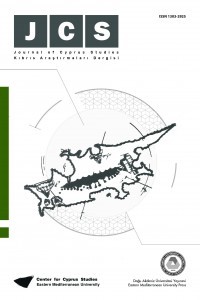Turkey’s EU Candidacy Process and Prospects for Democratic Settlement of the Cyprus Issue
Bu çalışma, Türkiye’nin AB’ye adaylık sürecinin Türkiye’nin Kıbrıs sorununa yönelik dış politikasına olan etkisini analiz etmektedir. Bunu yaparken, Avrupalaşma yaklaşımının neden olduğu dış politika değişimi aracılığı ile AB’nin politik şartlılığının Türkiye’nin Kıbrıs politikasına olan etkisine odaklanmaktadır. Bu çalışmann temel amacı, Türkiye’nin Kıbrıs’a yönelik dış politika hedefleri, tam olarak dönüşmemiş olsa da dış politika yapıcılarının politika stratejileri, araçları ve fırsat yapıları, Türkiye’nin Avrupalaşma süreci boyunca önemli ölçüde değişmiştir savını öne sürmektedir. Bu bağlamda bu makale, AB’nin Türkiye’nin Kıbrıs politikasını hangi ölçüde değiştiridiğini analiz etmek için Türkiye-AB ilişkilerinin geçtiği üç dönüm noktası çerçevesindeki politika değişimi ve sürekliliğini ele almaktadır. İncelenecek olan dönüm noktaları, Helsinki sonrası dönem, katılım müzakereleri süreci ve Avrupa Komisyonu’nun Aralık 2006 İlerleme Raporu sonrası dönemlerdir. Bütün bu dönemlerde Kıbrıs sorunu, AB Türkiye ilişkileri açısından önemli bir dış politika kısıtı olarak kendini göstermiştir. Ancak, AB’nin Kıbrıs’a yönelik politik şartlılığına Türkiye’nin yanıtı, Türkiye’nin 1999’dan günümüze uzanan Avrupalaşma süreci boyunca gözle görülür bir şekilde değişmiştir
Anahtar Kelimeler:
Avrupalaşma, Türkiye’nin AB Adaylığı, Kıbrıs Politikası
Turkey’s EU Candidacy Process and Prospects for Democratic Settlement of the Cyprus Issue
This paper analyzes the impact of Turkey’s EU candidacy process on Turkish foreign policy towards Cyprus. In doing that it focuses on the impact of the EU’s political conditionality on Turkey’s Cyprus policy through the lenses of the Europeanization approach to foreign-policy change. The main argument of the paper is that even though Turkey’s foreign-policy objective with regard to Cyprus has not substantially been transformed, the policy strategies, tools and opportunity structures of foreign-policy makers have considerably altered along Turkey’s process of Europeanization. The paper, therefore, explores the policy change and continuity in terms of three major historical turning points in TurkeyEU relations in order to analyze the extent to which Turkey’s Cyprus policy was influenced by the EU. These turning points are the post-Helsinki period 19992002 , the process of accession negotiations , and the post-December 2006, the European Commission’s Regular Report on Turkey. In all these periods, the resolution of the Cyprus conflict remained a major foreign-policy challenge for Turkey-EU relations. However, it is evident that Turkey’s policy responses to the EU’s political conditionality concerning Cyprus have significantly been transformed through Turkey’s process of Europeanization, which spans the period from 1999 to 2008
Keywords:
Europeanization, Turkey’s EU Candidacy, Cyprus Policy,
- ISSN: 1303-2925
- Başlangıç: 2019
- Yayıncı: Doğu Akdeniz Üniversitesi
Sayıdaki Diğer Makaleler
Turkey’s EU Candidacy Process and Prospects for Democratic Settlement of the Cyprus Issue
Petek KARATEKELİOĞLU, Volkan İPEK
EU’S Capacity of Creating Desirable Outcomes: Matters of Normative Leadership
The EU Conditionality in the Cyprus Problem: Catalyzing Euro-Scepticism in Turkey?
